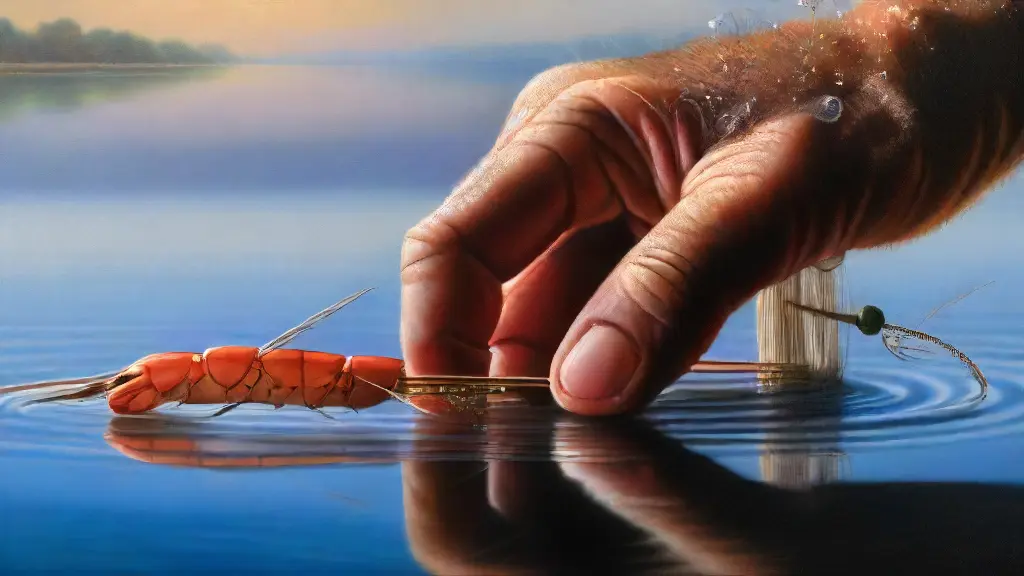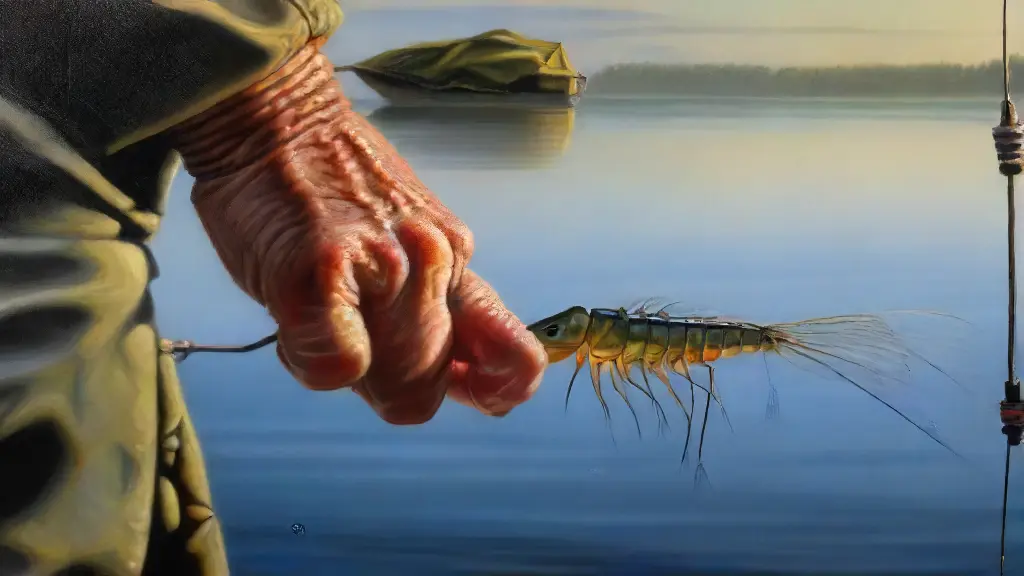Best Rigging Methods for Shrimp

Unlocking the Secrets of Shrimp Fishing When it comes to reeling in a bounty of shrimp, presentation is key. A well-designed rig can make all the difference between a successful catch and a blank expression.
Fishing involves a delicate balance of patience and strategy, and shrimp fishing is no exception.
Fishing is a waiting game, and shrimp fishing is no exception.
To increase the chances of a successful catch, anglers must understand the importance of presentation and bait management. Shrimp fishing techniques involve more than just tossing a hook and hoping for the best.
It requires an understanding of fish behavior, water conditions, and the type of shrimp being used as bait. Live bait is often the most effective method for presenting shrimp, as it provides a realistic food source that marine life such as fish and crustaceans find irresistible.
Fishing Gear for Shrimp Success
As the sun rises over the calm waters, a serene tranquility settles in, inviting anglers to embark on a thrilling adventure – shrimp fishing.
A solid foundation for shrimp fishing starts with having the right fishing gear.
A good tackle box should be stocked with essential lures that can effectively mimic shrimp or other baitfish, enticing predators like bass and catfish.
Crucial components include types of hooks, bobbers, and sinkers specifically designed for shrimp fishing.
Properly selecting and storing this gear ensures a successful day on the water.
Effective shrimp catching also relies on fundamental rigging techniques, as these methods help to maximize presentations and minimize snagging or missed bites.
Understanding how to apply pressure and control the movement of baits and lures is essential to tempting decapod crustaceans. As fishermen carefully manipulate their lines, a gentle tug often signals the catch of a prized Benthic Crustacean, often a Decapod species, caught using the right Fishing Gear and Tackle.

Why Rigging Matters
The Unseen Force Behind Shrimp Rigging. Its impact on catch rates is often underestimated, yet it holds the key to unlocking a more successful fishing experience.
As a significant contributor to the industry, shrimp rigging techniques have evolved over time to adapt to the ever-changing environment and shrimps’ natural behavior.
A recent study found that their natural behavior has a profound impact on fishing techniques, with a single misaligned rig potentially resulting in a 30% reduction in catch rates.
The secret to successful shrimp rigging lies in understanding the intricacies of shrimps’ movements and behavior. For beginners, starting with simple methods that mimic these.
| Shrimp Rigging Techniques | Impact on Catch Rates | Recommended Approach | Study Findings |
|---|---|---|---|
| Simple Methods | 30% reduction in catch rates | Mimic shrimps’ natural behavior | Single misaligned rig |
| Adaptive Techniques | Improved catch rates | Understand shrimps’ movements and behavior | Evolved over time |
| Understanding Shrimps’ Behavior | Key to successful fishing | Start with simple methods | Profound impact on fishing techniques |
What Lures Shrimp
The allure of freshwater shrimp fishing lies not just in the thrill of the catch, but in the intricate dance between angler and quarry. With over 2,000 species of freshwater shrimp, it’s essential to understand the subtleties of their behavior and the presentation of lures to reel them in.
Aside from the obvious factors such as jigging techniques and hook size, the way a lure is presented can greatly impact its effectiveness.
A well-presented lure can make all the difference between a bite and a rejection.
I. Introduction
II.
Habitat-Specific Lures
Benthic Zone Lures: For shrimp dwelling in the bottom-dwelling habitats, lures that mimic the substrate or structure of their environment are most attractive.
III. Prey-related lures employ various tactics, including jigging, hook size, hook type, lure selection, and bait presentation, to entice predators.
Shrimp Habitat Secrets
As the sun rises over the calm waters, anglers and marine biologists alike venture out to uncover the secrets of the ocean’s depths, mesmerized by the intricate dance of shrimp habitats.
Shrimp, being one of the most sought-after seafood delicacies, have fascinated anglers and marine biologists alike with their unique habits and adaptations.
Despite their tiny size, shrimp have evolved remarkable strategies to thrive in diverse aquatic environments, from coral reefs to estuaries.
Inshore anglers often rely on rigging techniques to lure in these feisty crustaceans, employing delicate baits and lures to entice them into biting.
Meanwhile, offshore fishing expeditions yield an array of game fish, providing a thrilling experience for those who dare to venture into the open waters. Understanding the intricacies of shrimp habitats is crucial for maintaining a delicate balance between human activities and offshore fishing.
Shrimp Facts
- Shrimp are one of the most sought-after seafood delicacies, with over 2,000 species found worldwide.
- Shrimp have evolved remarkable strategies to thrive in diverse aquatic environments, including coral reefs, estuaries, and mangrove forests.
- Shrimp habitats play a crucial role in maintaining a delicate balance between human activities and offshore fishing, as they provide important food sources for commercial fisheries and recreational anglers.
- Shrimp are an important indicator species, with changes in their populations and habitats serving as an early warning system for broader ecosystem health and climate change impacts.
How to Present Bait
Effective fishing strategies often begin with a precise understanding of the aquatic ecosystem and the tactics required to entice the desired catch. When anglers master the art of presenting bait, they can significantly improve their chances of reeling in a bountiful harvest.
I.
Introduce Essential Baiting Techniques
Defining Key Terms: Bait presentation, rigging, and sink rate are critical components of successful fishing.
A well-balanced presentation is essential, as it ensures the bait is presented in a way that attracts the target species.
II. Choose the Right Bait and Rigging Materials
The type of shrimp fishing gear and pier fishing accessories you choose depends on the species identification and fishing environment.
For instance, seafood enthusiasts may prefer a combination of live and artificial shellfish baits. When Pier Fishing, Seafood, Shellfish, Shrimp Fishing, and Species Identification come together, we can accurately assess the
Effective Angling Techniques
As we venture into the world of angling, we’re driven by the promise of an exhilarating experience, but beneath the surface lies a complex web of techniques and nuances that separate the accomplished from the novice.
Rigging Fundamentals are crucial for a successful day on the water.
Understanding the importance of a secure line to lure connection ensures that your bait or lure remains in place, increasing the chances of a catch.
This simple yet often-overlooked aspect sets the stage for a productive fishing excursion.
In ideal Water Clarity, the visibility is high, making it easy to detect even the slightest movement. As the water becomes murkier, adapting to changing conditions is key to successfully locating and catching your target species. By incorporating Water Conditions into your approach, you’ll be better equipped to navigate the depths.
| Rigging Fundamentals | Water Conditions | Line Connection | Water Clarity |
|---|---|---|---|
| Secure line to lure connection | Adapting to changing conditions | Increases chances of a catch | Easy to detect movement |
| Crucial for a successful day | Key to successfully locating | Ensures bait or lure remains in place | Makes it easy to detect even the slightest movement |
| Simple yet often-overlooked aspect | Navigating the depths | Increases chances of a catch | High visibility |
Shrimp Identification Tips
As you cast your line into the water, the thrill of anticipation begins to build. To land a prize catch, it’s crucial to understand the intricacies of shrimp behavior and learn how to identify the right species.
I.
Setting the Hook
a.
Identifying the right bite: When it comes to fishing for shrimp, water temperature is the unsung hero, with a sweet spot ranging from 65°F to 75°F that encourages these crustaceans to be their most active selves.
b.
Reading the water: Aquatic habitats play a significant role in determining the type of shrimp that inhabit a particular area, with weed beds, rocks, and drop-offs serving as crucial clues to identify the most likely spots to catch shrimp.
c.
Best Hooking Methods
Mastering the Art of Freshwater Shrimp Fishing. Fishing Tackle Box enthusiasts often underestimate the importance of a well-executed hooking method, which can make all the difference between a successful catch and a disappointing day on the water.
Adaptability is key in freshwater shrimp fishing, as different water conditions and shrimp species require unique hooking methods.
For instance, a drop shot rig may be ideal for murky waters, while a bottom bouncing rig excels in clearer waters.
Freshwater Fishing Gear is especially crucial in this process, as the right equipment can help anglers present their bait effectively and increase their chances of landing a prized shrimp. When it comes to the type of fishing, selecting the right fishing tackle box and freshwater fishing gear is crucial for a successful catch.
Freshwater Shrimp Fishing
- Adaptability is key in freshwater shrimp fishing, as different water conditions and shrimp species require unique hooking methods.
- A drop shot rig may be ideal for murky waters, while a bottom bouncing rig excels in clearer waters.
- Freshwater Fishing Gear is especially crucial in this process, as the right equipment can help anglers present their bait effectively and increase their chances of landing a prized shrimp.
- Selecting the right fishing tackle box and freshwater fishing gear is crucial for a successful catch.
How to Rig Live Bait for Trolling
How to Rig Worms for Bass Fishing


